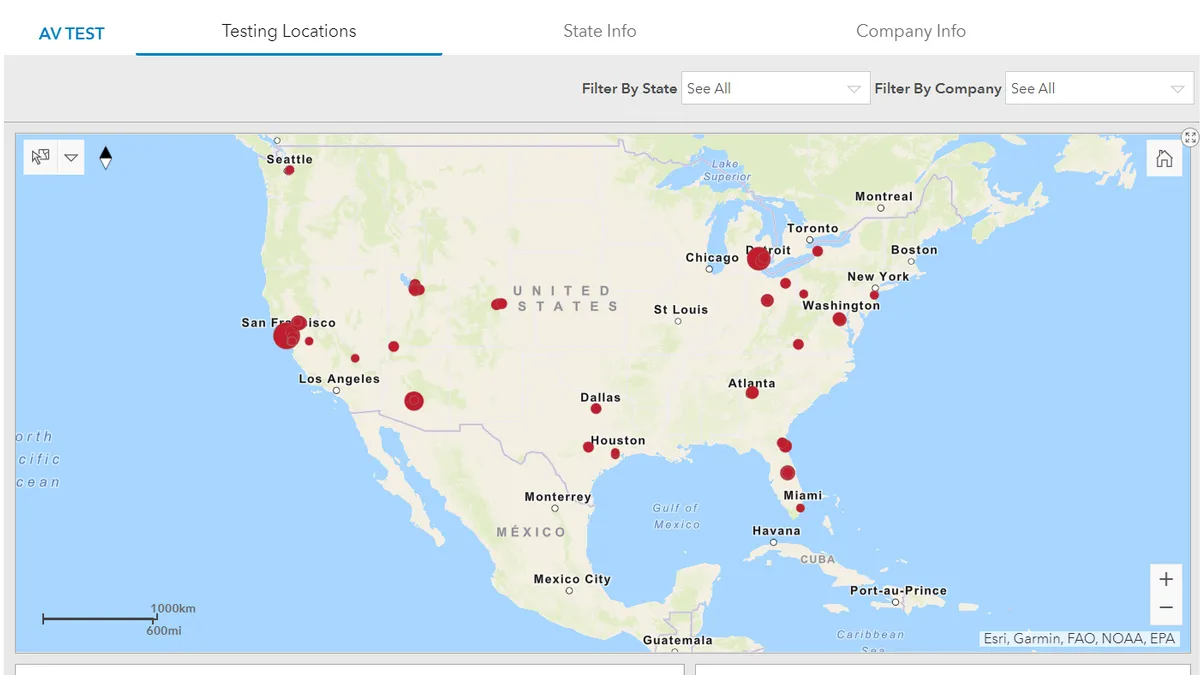UPDATE, Sept. 3, 2020: The National Highway Traffic Safety Administration (NHTSA) has unveiled its interactive, public-facing tool to provide transparent information regarding autonomous vehicle (AV) testing nationwide.
The tool, born of the agency's Automated Vehicles Transparency and Engagement for Safe Testing (AV TEST) Initiative, breaks AV test information into three categories: testing locations, state info and company info.
Under the "testing locations" tab, a map displays red dots to indicate AV tests currently underway, with each dot providing details on the location, related companies and status of the tests. The "state info" tab provides a breakdown of each state's specific autonomous system testing and development regulations. The "company info" tab includes details on each company voluntarily participating in AV TEST, including their related safety self-assessments and progress reports.
While the map is a work-in-progress, NHTSA said it will continue to gather information and expand the project to include more companies, states and cities. The group also said it will continue to host public meetings and panel discussions to educate the public and stakeholders on AV TEST's goals and progress.
Dive Brief:
- The National Highway Traffic Safety Administration (NHTSA) on Monday announced the launch of its Automated Vehicles Transparency and Engagement for Safe Testing (AV TEST) Initiative, which encourages stakeholders to voluntarily share data regarding the on-road testing and development of AV systems. This data will then be displayed on a first-of-its-kind open data platform, accessible to the public.
- Nine companies and eight states were listed as the initial stakeholders to commit to the initiative. Participation in the AV TEST Initiative is open to "all stakeholders involved in the development and testing of vehicles equipped with automated driving systems in the United States," said NHTSA Deputy Administrator James Owens in a kickoff call.
| Company participants | State participants |
|---|---|
| Beep | California |
| Cruise | Florida |
| Local Motors | Maryland |
| NAVYA | Michigan |
| Nuro | Ohio |
| Toyota | Pennsylvania |
| Uber | Texas |
| Waymo | Utah |
| Fiat Chrysler |
- "AV technologies are not yet advanced enough to enable wide-scale deployment of fully autonomous vehicles, but someday they will be and the department is doing its part right now to help with that effort," said U.S. Secretary of Transportation Elaine Chao on the call. The public-facing platform is slated to launch in mid-to-late summer.
Dive Insight:
The U.S. Department of Transportation (USDOT) and NHTSA have pushed a number of efforts over the last five years to keep governments and automated driving companies collaborating and communicating about the advancement of AV systems. This has been done through the encouragement of voluntary self-assessments, development of coordinated councils and release of various guidelines. Most recently, Chao unveiled AV 4.0 guidelines to unify efforts across 38 federal departments working to advance safe AV deployment.
AV TEST marks a first for NHTSA in regards to how this information, which has long been shared across industry, can be communicated to the public to dispel myths and misunderstandings about the future of autonomous driving.
"There has been no one-stop, centralized, nationwide source for information and transparency about the safe testing and development underway, until now," Owens said.
Initial participants in this initiative range from new startups like Beep, to legacy OEMs or tech companies hoping to spread their reach in advanced mobility, such as Toyota and Uber.
"The importance of transparency I think is so critical and it’s something we’ve practiced from day one," said Beep CEO Joe Moye in an interview with Smart Cities Dive following the announcement. "We need to learn from each other across industry because we’ve all got different types of operations being tested out there."
Moye said the platform will allow companies to disseminate information much more broadly than before, while also serving as a tool that companies can use to keep tabs on AV developments across the U.S. While consumers have a more limited knowledge and understanding of AV systems than industry stakeholders do, the tool will be designed to be used by all, regardless of expertise, Moye said.
"Obviously there’s key data that...will be more technical type documents, but there’s also a lot of good use case information in layman's terms, if you will, that will make it something of value to people that aren't specialists in one area of technology," he said.
Despite optimism from USDOT, associated departments and involved stakeholders, not everyone is convinced the voluntary initiative will actually move the needle in creating safe autonomous vehicle systems. In a statement, Advocates for Highway and Auto Safety President Cathy Chase called NHTSA's reliance on voluntary participation "a recipe for disaster."
"The definition of insanity is repeating the same thing over and over and expecting a different result," Chase wrote. "Instead of the U.S. DOT continuing to issue voluntary, unenforceable agreements to the peril of all road users, it should fulfill its responsibility [to] make our roads safe and develop minimum performance standards. These baselines will protect the billions of dollars AV developers have invested, help foster public confidence and inspire innovation to exceed them."












